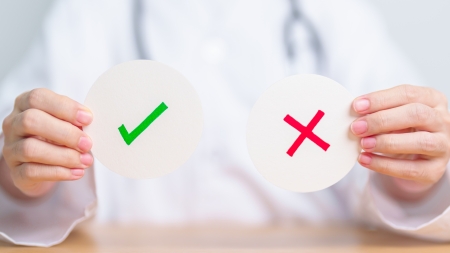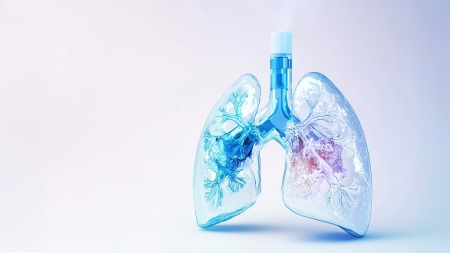How are cancer and nutrition linked?
Time spent enjoying a good meal with family or friends is a pleasure for many people. If we talk about food, however, we also have to address the topic of health. What we eat, and the amount of food we eat, has an effect on the body.

Your diet as well as your weight and how much exercise you get can all play a part in whether you have a higher or lower risk of getting cancer. Fruit, vegetables, wholemeal products, pulses, secondary plant nutrients and fibre can reduce your risk of cancer. The Cancer League bases its recommendations on those of the World Cancer Research Fund International. These recommendations focus on the prevention of cancer through nutrition.
What can lower my risk of developing cancer?
- Fruit, vegetables, wholemeal products and pulses
- Dairy products
- Secondary plant nutrients and dietary fibre
What can increase my risk of developing cancer?
- Being overweight can pose a health risk.
- The consumption of alcohol is another risk.
- Eating a lot of red and processed meat is also detrimental.
- Highly processed foods and sugary drinks are not good for your health.
- Nutritional supplements should be taken with care.
- Carcinogenic substances can form when food is stored or processed.
Why should I opt for plant-based foods?
Scientific research has shown that eating lots of fruit and vegetables reduces the risk of cancer. This can also help you to avoid becoming overweight. This is because being overweight can increase your risk of developing cancer. For this reason, three quarters of your meal should be made up of fruit, vegetables, potatoes, pulses and wholemeal products.
How can plant-based foods help keep me healthy?
Eating more plant-based foods reduces your risk of becoming overweight. Your blood pressure will go down. Your risk of developing heart disease and certain types of cancer decreases. You are less likely to develop colon cancer, for instance.
Fruit and vegetables contain many useful secondary plant nutrients. These give them their colour and aroma. They help the body to fight inflammation. These kinds of food contain plenty of vitamins and minerals that are beneficial for your health. That's why you should eat fruit and vegetables every day - preferably with every meal.
Tips
- That's why you should eat fruit and vegetables every day - preferably with every meal.
- Eat five portions of fruit and vegetables every day.
- As vitamins are sensitive to heat, sunlight and air, you should not only eat fruit and vegetables cooked, but also raw.
- Buy locally grown fruit and vegetables that are in season. It tastes better when it is harvested when ripe, and shorter transportation distances are better for the environment.
How does dietary fibre help my health?
Dietary fibre helps you to develop healthy intestinal flora. Intestinal flora are made up of many bacteria that exist in our intestines. These are also referred in medicine as the microbiome or microbiota. These bacteria help us to digest food. For example, they break down substances that our gut could not digest on its own. It is helpful if the intestinal flora contain a variety of different bacteria. Dietary fibre helps in this process.
This is how dietary fibre helps:
- It keeps us fuller for longer.
- It helps to regulate the speed at which stools pass through the intestines.
- It can also absorb substances in the intestine, such as bile acids.
Tips
- Make a point of eating pulses and whole foods, such as wholemeal bread and wholemeal pasta because these foods contain a lot of fibre.
- Start slowly when you start increasing the amount of fibre-rich foods you eat. This will help your gut to adjust more easily.
- Drink 1 to 2 litres of water per day. This is important if you consume a lot of fibre.
Do “anti-cancer” diets or fasting help against cancer?
There are many diets that claim to prevent cancer. The ketogenic diet is one of them. This involves avoiding foods rich in carbohydrates such as bread, pasta, potatoes and sugar. Other diets require you to eat a lot of cereals. Others are based exclusively on juices and raw food.
Fasting means not eating anything. However, you do need to drink enough water. Some people fast for a few hours, others for days. Some people fast regularly, others not at all.
No effect on cancer
Scientific research has not found any evidence to suggest that specific diets or fasting can prevent or help fight cancer. Quite the opposite, dieting or fasting can result in weight loss and the breakdown of muscle.
Is there such a thing as “anti-cancer” foods?
Many foods such as garlic, cabbage, green tea, coffee, ginger and milk contain substances that can protect against cancer. However, in order to prevent cancer, they do not have to be consumed in large quantities. The body only needs the quantities that we consume as part of a balanced diet.
Do I need to take vitamins or nutritional supplements?
Unless you have a deficiency, you do not need to take any vitamins or supplements. There is no scientific evidence that they prevent cancer.
In fact, a number of research studies suggest that under certain circumstances dietary supplements can increase the risk of cancer. Taking a large doses of vitamin E or selenium over a lengthy period of time can increase the risk of prostate cancer. Beta-carotene or vitamin A can increase the risk of smokers developing lung cancer.
This applies if you take vitamins or supplements in tablet or powder form. It does not apply if you consume vitamins and minerals as natural components of fruit or vegetables.
Tips
- If you eat a varied diet, your body will absorb many different nutrients.
- Make sure not to consume too many additives in such products as fruit juices or muesli, as this can also result in an overdose of vitamins.
- Include plenty of fruit and vegetables, in well as nuts and wholemeal products in your diet.


